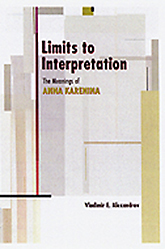|
Limits to Interpretation
The Meanings of Anna Karenina
Vladimir E. Alexandrov
Winner, Aldo and Jeanne Scaglione Prize for Slavic Literary Studies, Modern Language Association
Finalist, Best Book of Literary/Cultural Scholarship, American Association of Teachers of Slavic and Eastern European Languages
An imaginative, revealing analysis
Vladimir E. Alexandrov advocates a broad revision of the academic study of literature, proposing an adaptive, text-specific approach designed to minimize the circularity of interpretation inherent in the act of reading. He illustrates this method with the example of Tolstoy's classic novel via a detailed "map" of the different possible readings that the novel can support. The novel Anna Karenina emerges as deeply conflicted, polyvalent, and quite unlike what one finds in other critical studies.
 Vladimir E. Alexandrov is the B. E. Bensinger Professor of Slavic Languages and Literatures at Yale University, editor of The Garland Companion to Vladimir Nabokov, and author of Nabokov's Otherworld and The Black Russian.
Vladimir E. Alexandrov is the B. E. Bensinger Professor of Slavic Languages and Literatures at Yale University, editor of The Garland Companion to Vladimir Nabokov, and author of Nabokov's Otherworld and The Black Russian.
Praise
“A major contribution to Tolstoy studies. ... Essential.”
—Choice
“A powerful, authoritative, and subtle reading of Anna Karenina that is likely to become a classic of Tolstoy criticism. . . . Alexandrov offers a complex account . . . that opens many interpretive doors.”
—Russian Review
“I find this book particularly attractive because it is rooted in formalist and structuralist theory, skeptical about both the premises and the results of much (especially American) later criticism, and respectful of the text of Anna Karenina.”
—Slavic Review
“Alexandrov does not insist on the resolution of the novel's basic contradictions but leaves it to his reader what to make of Anna Karenina: a work whose tumult of meanings ultimately undoes it or makes it mysterious and rich, like life.”
—Modern Philology
“A wise and erudite study that uses Tolstoy’s Anna Karenina to account for the plural meanings that a great work of art provokes. . . . A forceful and persuasive argument against originality of interpretation.”
—Peter Brooks, author of Henry James Goes to Paris
“An important book. . . . In addition to being a masterful contribution to our understanding of a great work of art it is a manifesto proclaiming a new theory of reading in general.”
—Michael Holquist, author of The Dialogic Imagination
“An immensely thorough, imaginative, original, and revealing analysis of this great novel that is at the same time a forthright advocacy of more rigorous, text-focused interpretation. The book should thus be of great interest both to Tolstoy aficionados and to adepts of the theory of narrative prose.”
—Hugh McLean, author of In Quest of Tolstoy
“An extended and brilliant reading of Anna Karenina showing a variety of plausible meanings and implying at the same time that there are limits to interpretation. A complex argument but a central one to recovering the integrity of the literary text and the dignity of the critical profession.”
—Alvin Kernan, author of The Death of Literature
|

New in Paperback!
October 2017
LC: 2003022202 PQ
368 pp. 6 x 9
|

